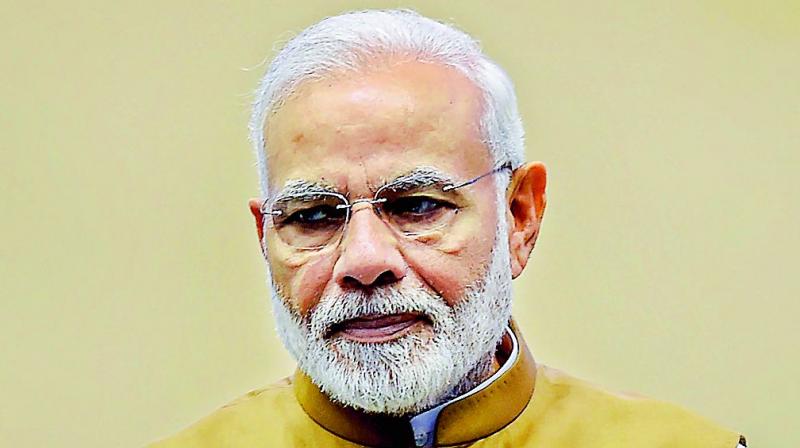When coalition maths goes far off the mark

One of the familiar arguments in drawing rooms, television channels’ panel discussions and newspaper/Web columns is that the inability of the arrogant Congress to reach out to smaller parties like the Bahujan Samaj Party (BSP), the Samajwadi Party (SP) and others is only strengthening the Bharatiya Janata Party (BJP) led by Prime Minister Narendra Modi and party chief Amit Shah to lead the BJP and the National Democratic Alliance (NDA) back to power at the Centre in the summer of 2019. The argument is based on caste numbers and it cannot be faulted because in a state like Uttar Pradesh, which has 80 Lok Sabha seats, caste is indeed the calling card. The arithmetic stares you in the face and the byelections to the Lok Sabha from Gorakhpur and Phulpur seemed to have only confirmed it. So, if the Congress does not knowtow to the demands of the BSP and SP in UP, then it would be doing a disservice to the so-called secular cause.
What is not reckoned in analysing the politics of caste and community is the intangible factor of the general mood of the public that goes beyond the predetermined social faultlines. If the BJP had won the 2014 Lok Sabha and the 2017 Assembly elections in Uttar Pradesh only on the back of a united Hindu vote, where the dalit and Muslim vote did not matter, then the BJP should be winning every time in UP because the Hindu majority is always there. What is overlooked is that the Hindu vote does not always go to the BJP, and that the dalit and Muslim vote had never gone to the BJP. What explains the minor shifts in voting patterns with major consequences for electoral outcomes is the general mood of the people at large. Sometimes they believe a party and a leader, and at other times they go against them. The ostensible Hindu vote of the BJP is the BJP’s eternally.
Another popular conspiracy theory is that the Rashtriya Swayamsevak Sangh (RSS) volunteers make or mar an election. It is the RSS’ stranglehold through its workers at the polling booth which decides the election, and no other party can match the cohesive contingents of the Sangh which manage the polling booths. Every BJP victory is explained away by the left secularists as the miracle wrought by the RSS. The RSS is projected as the invincible evil force in the country and the people are unthinking puppets in their hands. If the theory of the pervasive dominance of the RSS in our electoral politics is indeed true, then no party other than the BJP should win the elections every time. There is of course the slight modification of theory when the Congress wins, and it is then argued that the virtuous RSS was unhappy with the unworthy BJP, and for the sake of the nation, the RSS worked for the victory of the Congress. Either way, the RSS is made out to be the decisive force in the country’s electoral politics.
There is little doubt that the RSS ideology of nationalism is belligerent, negative and retrogressive, but there is little really to show that the RSS wields unparalleled clout in the country’s politics. The RSS aspires to be the supreme mentor in the country, but this aspiration remains a delightful hallucination. It is not very different from the delusion of the Left and secular parties that the poor people will never vote for a reactionary party like the BJP. They do but not for ideological reasons. The people have a mind of their own and they are not willing to be led like sheep by the RSS or anyone else. If the people chose to vote for the BJP in 2014, they did so because they preferred the BJP at that time. If they re-elect the BJP in 2019 it is the choice of the people and not a right-wing conspiracy.
The Congress in its heyday, as well as the BJP now, persuade themselves and others that they will remain in power because there is no viable alternative. The argument of the BJP leaders and that of their supporters is that people will never accept an immature Rahul Gandhi and a jaded Congress to lead the country, and that the other parties are too small to challenge a national party like the BJP. The argument is so full of common sense that middle-of-the-ground folk say that they do not like the Modi-Shah BJP, but the alternatives are worse, and thus the BJP remains the only option. In the 1960s and 1970s, for instance, this was indeed the argument of most neutral political observers that there was no viable alternative to the Congress.
There is also the defeatist argument that there is no way that the BJP can be defeated in an election because it is in power and it will manipulate the result. The same argument was proffered in the case of the Congress in the 1960s and the 1970s. The parties in power are more likely to resort to abuse of power than those who are in the Opposition. But the manipulation does not help if the people have decided to throw the party out of power. This has happened to the Congress and the BJP several times. The “There Is No Alternative” (TINA) factor is the refuge of the pessimist but not that of the people. Even if the alternatives do not exist, people still reject the parties in power. That is the real charm of democracy.
The writer is a Delhi-based commentator and analyst

